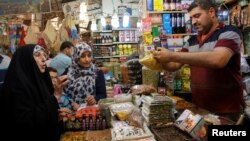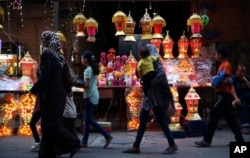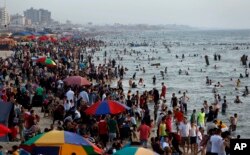President Barack Obama has issued his annual Ramadan greeting as Muslims around the world are preparing to observe the holy month, which is expected to begin late Sunday or Monday, depending on the first sighting of the new moon.
"As Muslim Americans celebrate the holy month," he said in a statement issued by the White House, "I am reminded that we are one American family. I stand firmly with Muslim American communities in rejection of the voices that seek to divide us or limit our religious freedoms or civil rights."
Obama urged Americans to remember the millions of people whose lives have been displaced by conflict and struggle across the world.
Muslims are expected to spend the month fasting during daylight hours, eschewing even water, and spending more time in prayer and study of the Quran. They are supposed to avoid bad habits and indulgences, such as smoking and sex.
Cultural differences and even geography have led to differences in the ways Muslims observe the holy month. Fasting during daylight hours has proven difficult for people living near polar regions during the long days of the summer. Muslim clerics have in the past few years issued fatwas allowing Muslims in regions where the sun does not set in summer -- or, when Ramadan falls in winter, where the sun does not rise -- to follow the sunrise and sunset times of Mecca.
Like their fellow worshippers around the world, Muslims in the United States are watching the skies and preparing for the holiest month.
Jibril Hough, spokesman for the Islamic Center of Charlotte, North Carolina, says Ramadan is different in the United States than in countries with larger Muslim populations.
Hough says because there are fewer Muslims in the United States, Ramadan is a time to gather at the mosque with fellow believers, rather than at home, as the faithful might do elsewhere.
"The Ramadan experience is more collective," he says. "We are a religious minority in America and ... especially toward the end of Ramadan, we bring food to the masjid (mosque), it becomes more like a family reunion. A lot of times you see brothers and sisters that you haven't seen all year.
Like most Muslims, Hough continues to work during Ramadan, which is challenging when one's job is physically demanding and the North Carolina summer is in full swing.
It is also not easy to explain to his non-Muslim coworkers why he can't have a drink of water when he gets thirsty. But he says his religious commitment makes the sacrifice worth it.
"You know you have to do it," he says. "God has commanded you to do it. That's half the battle right there. A lot of it is mental."
Different paths
Even among U.S. Muslims, there are different paths toward the same goal. Amani Elkassabany, a teacher in Bethesda, Maryland, says she has modified her fasting practices over the years.
Elkassabany says fasting all day can make a person too focused on breaking the fast at the end of the day, and result in overindulgence after sundown -- a practice Muslim writings discourage.
"Recently, I've tried to observe what is best about the fast without following it to the letter," she says. "So this year, I won't be not eating or drinking from sunrise to sunset. But I will be eating only two meals a day instead of three.
"I will stop eating meat, poultry, and dairy products for ethical, health and environmental reasons. I will seek out opportunities to build spiritual community with others. I will work on building more compassion and kindness into all my interactions with others," Elkassabany says.
Building spiritual community is an important part of the observance of Ramadan, Hough says. And not just among the faithful.
During the evening "iftar" meal after sunset, some mosques open their doors to non-Muslims, who are invited to come and eat, to observe or participate in prayers, and to engage in conversation.
Open house
The open house idea is one way to help allay people's fears about Islamic extremism. French mosques opened their doors in January for a weekend-long event after the November 13 attacks in Paris.
One might expect that Ramadan observers would be relieved when the month of fasting and discipline is over. But Hough says it is a little bittersweet.
"Even though you're glad you can eat and be more leisurely, it's like a family member has been visiting you for the last month and you're sad that the visit is over," he says.
But Hough says he tries not to let everything slip away. "Coming out of Ramadan, you try to hold on to some things you gave it. Hold on to the good habits."






